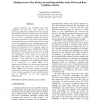Free Online Productivity Tools
i2Speak
i2Symbol
i2OCR
iTex2Img
iWeb2Print
iWeb2Shot
i2Type
iPdf2Split
iPdf2Merge
i2Bopomofo
i2Arabic
i2Style
i2Image
i2PDF
iLatex2Rtf
Sci2ools
110
click to vote
DSN
2007
IEEE
2007
IEEE
Multiprocessors May Reduce System Dependability under File-Based Race Condition Attacks
Attacks exploiting race conditions have been considered rare and “low risk”. However, the increasing popularity of multiprocessors has changed this situation: instead of waiting for the victim process to be suspended to carry out an attack, the attacker can now run on a dedicated processor and actively seek attack opportunities. This change from fortuitous encountering to active exploiting may greatly increase the success probability of race condition attacks. This point is exemplified by studying the TOCTTOU (Timeof-Check-to-Time-of-Use) race condition attacks in this paper. We first propose a probabilistic model for predicting TOCTTOU attack success rate on both uniprocessors and multiprocessors. Then we confirm the applicability of this model by carrying out TOCTTOU attacks against two widely used utility programs: vi and gedit. The success probability of attacking vi increases from low single digit percentage on a uniprocessor to almost 100% on a multiprocessor. Similarly, the...
| Added | 02 Jun 2010 |
| Updated | 02 Jun 2010 |
| Type | Conference |
| Year | 2007 |
| Where | DSN |
| Authors | Jinpeng Wei, Calton Pu |
Comments (0)

